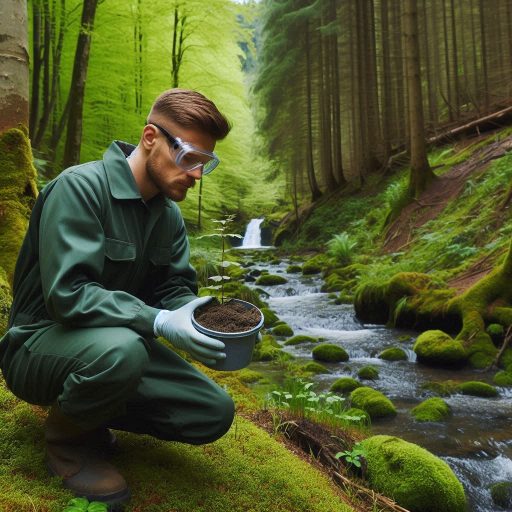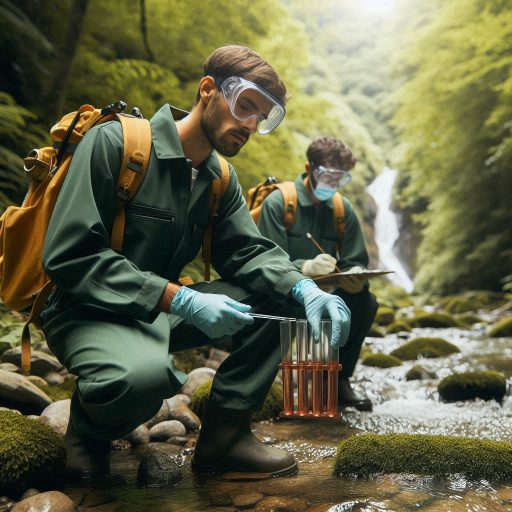Introduction
Brief Overview of the Importance of Environmental Technicians in Safeguarding the Environment
Environmental technicians play a crucial role in protecting our planet.
They monitor and manage environmental systems to prevent pollution and ensure sustainable practices.
These professionals conduct fieldwork and laboratory analysis to assess environmental conditions.
Their work helps identify sources of contamination and implement corrective measures.
By performing detailed inspections and collecting data, they provide essential information for environmental protection and policy-making.
Their expertise contributes to cleaner air, water, and soil, benefiting ecosystems and human health.
In short, environmental technicians are vital for maintaining ecological balance and promoting sustainable development.
The Increasing Demand for Skilled Environmental Technicians in the USA
The demand for skilled environmental technicians in the USA is on the rise.
As environmental concerns grow, industries seek professionals to address complex issues.
Urbanization and industrial activities increase the need for effective environmental management.
Government regulations and public awareness drive the need for expertise in this field.
Many sectors, including manufacturing, energy, and waste management, require environmental technicians.
Their skills help companies comply with environmental laws and improve sustainability practices.
The job market for these technicians is expanding, offering numerous opportunities for employment.
As environmental challenges continue to evolve, so will the demand for qualified technicians.
Overview of Environmental Technician Programs
Environmental technician programs are designed to train individuals in monitoring and managing environmental issues.
Students learn about various aspects of environmental science and technology to help protect and preserve the environment.
Explanation of Environmental Technician Programs
Environmental technician programs focus on providing students with the necessary skills and knowledge to work in the environmental field.
These programs typically include courses in environmental science, biology, chemistry, and specialized training in various environmental monitoring techniques.
Various Specializations within the Field
Within the field of environmental technician programs, there are several specializations that students can choose from based on their interests and career goals.
Some of the common specializations include:
- Air Quality Monitoring: Students study the methods and technologies used to monitor and analyze air quality, identify pollutants, and assess their impact on the environment and public health.
- Water Management: This specialization focuses on the management and conservation of water resources, including monitoring water quality, analyzing contaminants, and developing sustainable water management strategies.
- Waste Management: Students in this specialization learn about waste treatment technologies, waste disposal methods, recycling processes, and regulations related to waste management to minimize environmental impact.
These specializations provide students with a comprehensive understanding of specific environmental issues and equip them with the skills needed to address these challenges in the field.
Environmental technician programs offer hands-on training, fieldwork opportunities, and internships to help students gain practical experience in their chosen specialization.
Read: Recent Trends in Surveying and Mapping Technologies
Criteria for Evaluating Top Programs
- Accreditation: Ensure the program is accredited by a reputable organization to guarantee quality education.
- Curriculum: Look for a comprehensive curriculum that covers a wide range of environmental topics and current trends.
- Faculty expertise: Check the qualifications and experience of the faculty members to ensure top-notch instruction.
- Job placement rates: Research the program’s track record in helping graduates secure employment in the field.
Importance of Hands-on Experience and Practical Training
Hands-on experience and practical training are crucial components of an environmental technician program.
These aspects provide students with real-world skills and knowledge that are essential for success in the field.
Here are some reasons why hands-on experience is vital:
- Applied Learning: Hands-on experience allows students to apply theoretical knowledge in practical settings, reinforcing their understanding of concepts.
- Skills Development: Practical training helps students develop technical skills, such as conducting fieldwork, data analysis, and using specialized equipment.
- Problem-Solving Abilities: By engaging in hands-on tasks, students learn how to solve complex problems they may encounter in their future careers.
- Industry Connections: Practical training often involves working with industry professionals, enabling students to network and establish valuable contacts.
- Preparation for the Job Market: Employers highly value candidates with hands-on experience, making graduates more competitive in the job market.
Overall, a balance of theoretical knowledge and practical skills is essential for students to excel in the field of environmental technology.
Programs that offer hands-on experience alongside a strong academic foundation are more likely to produce well-rounded and competent professionals.
Read: Safety Tips for Field Surveying Technicians
Top Environmental Technician Programs in the USA
Looking to kickstart your career as an environmental technician in the USA?
Here is a list of top programs across the country that are known for their excellence in training environmental technicians:
University of California, Berkeley
UC Berkeley offers a comprehensive environmental technician program that covers a wide range of topics including pollution prevention, waste management, and environmental regulations.
Colorado State University
CSU is another top-notch institution for aspiring environmental technicians.
Their program focuses on hands-on training and real-world applications in the field.
Pennsylvania State University
Penn State has a well-established environmental technician program with a strong emphasis on sustainability and conservation practices.
Students gain valuable skills through internships and research projects.
Texas A&M University
Known for its cutting-edge research in environmental science, Texas A&M offers a rigorous program for aspiring environmental technicians.
Students have access to state-of-the-art facilities and faculty members.
Ohio State University
OSU’s program in environmental technology is highly regarded for its interdisciplinary approach.
Students learn to analyze environmental data, conduct field surveys, and develop sustainable solutions.
Virginia Tech
Virginia Tech offers a diverse range of courses in environmental technology, from water quality monitoring to air pollution control.
The program equips students with the skills needed to address complex environmental challenges.
Michigan Technological University
MTU’s program in environmental science and technology is known for its focus on environmental monitoring and analysis.
Students learn to use advanced tools and techniques to assess environmental impacts.
These are just a few of the top environmental technician programs in the USA.
Each institution offers unique strengths and opportunities for students looking to make a difference in the field of environmental protection.
Read: Top Surveying and Mapping Technician Employers
Transform Your Career Today
Unlock a personalized career strategy that drives real results. Get tailored advice and a roadmap designed just for you.
Start Now
Program Spotlight: Green Innovators Program
In this section, we will take an in-depth look at a specific environmental technician program, detailing its curriculum, faculty, facilities, and hands-on training opportunities.
We will also include testimonials from students or alumni about their experiences in the program.
Curriculum
- The Green Innovators Program curriculum is designed to provide students with a solid foundation in environmental science, chemistry, and fieldwork techniques.
- Courses cover topics such as air and water quality monitoring, hazardous waste management, and environmental regulations.
- Students also have the opportunity to choose elective courses in specialized areas such as renewable energy or conservation biology.
Faculty
- The faculty at Green Innovators Program are experts in their field, with many years of experience working in environmental science and related disciplines.
- They are dedicated to providing students with quality education and mentorship, both inside and outside the classroom.
- Students have the opportunity to work closely with faculty on research projects and internships, gaining valuable hands-on experience.
Facilities
- Green Innovators Program is equipped with state-of-the-art laboratories and field equipment for hands-on training and research.
- Students have access to tools and resources needed to conduct experiments, analyze data, and develop solutions to environmental challenges.
- Field trips and fieldwork opportunities are also available to allow students to apply their knowledge in real-world settings.
Hands-on Training Opportunities
- One of the highlights of Green Innovators Program is the emphasis on hands-on training opportunities for students.
- Students have the chance to participate in fieldwork, internships, and research projects to gain practical experience.
- This hands-on training helps students develop skills and knowledge that are essential for success in the environmental technician field.
Testimonials
Here are some testimonials from students or alumni of Green Innovators Program about their experiences:
“The hands-on training opportunities at Green Innovators Program helped me develop practical skills and confidence in the field. I am grateful for the support and guidance from the faculty.”
“The curriculum at Green Innovators Program is comprehensive and covers a wide range of topics in environmental science. I particularly enjoyed the field trips and research projects.”
Overall, Green Innovators Program offers a well-rounded environmental technician program with a strong curriculum, experienced faculty, top-notch facilities, and valuable hands-on training opportunities.
Students can expect to gain the knowledge and skills needed to succeed in the field and make a positive impact on the environment.
Read: Surveying and Mapping Technician Internships: A Guide
Internship and Job Opportunities for Graduates
Internships are crucial for gaining real-world experience and practical skills.
Importance of Internships in Gaining Real-World Experience
- Internships provide hands-on training and exposure to different environmental technician tasks.
- They allow students to apply theoretical knowledge in real-world settings.
- Internships help students develop problem-solving skills and critical thinking abilities.
- Building professional networks and mentorship opportunities are other benefits of internships.
- Employers highly value candidates with internship experience on their resumes.
Job Prospects and Potential Employers for Graduates of Environmental Technician Programs
Graduates of environmental technician programs have a wide range of job prospects in various industries:
- Environmental consulting firms hire environmental technicians to assist with research and fieldwork.
- Government agencies at the local, state, and federal levels employ environmental technicians for monitoring and compliance.
- Non-profit organizations focused on environmental conservation often have positions for environmental technicians.
- Energy companies hire environmental technicians to ensure compliance with environmental regulations.
- Manufacturing companies recruit environmental technicians to oversee waste management and pollution prevention.
Overall, the job market for environmental technicians is diverse and offers opportunities for growth and development.
Scholarships and Financial Aid Options
When it comes to pursuing a career in environmental technology, obtaining financial assistance can be crucial.
Here are some options available for students looking to offset the cost of their education in this field:
Scholarships
- Many organizations and institutions offer scholarships specifically for students studying environmental technology. These scholarships can vary in amount and eligibility requirements.
- Some scholarships may be merit-based, while others may be need-based. It’s important to research and apply for scholarships that align with your qualifications and background.
- Examples of organizations that offer environmental technology scholarships include the Environmental Defense Fund, National Wildlife Federation, and the Sierra Club.
- Students can also check with their school’s financial aid office for information on any scholarships available through the institution.
Grants
- Grants are another form of financial aid that students can pursue to help cover the cost of their environmental technology programs.
- These grants may be provided by government agencies, non-profit organizations, or private foundations that support education in environmental fields.
- Students can search for grants through online databases, such as Grants.gov or the Foundation Center, to find opportunities that match their education and career goals.
- It’s important to carefully review the eligibility criteria and application deadlines for each grant opportunity to increase your chances of success.
Financial Aid
- In addition to scholarships and grants, students pursuing environmental technology programs may also be eligible for traditional financial aid options, such as student loans and work-study programs.
- It’s recommended that students fill out the Free Application for Federal Student Aid (FAFSA) to determine their eligibility for federal grants, loans, and work-study opportunities.
- Students may also explore employer tuition assistance programs or tuition reimbursement benefits if they are currently employed in a relevant field.
- Financial aid advisors at colleges and universities can provide guidance on the best options for funding your education in environmental technology.
Tips for Securing Funding
- Start researching and applying for scholarships and grants early to maximize your chances of receiving financial assistance for your environmental technology program.
- Make sure to tailor your scholarship applications to highlight your passion for environmental conservation and your dedication to pursuing a career in this field.
- Consider reaching out to professors, mentors, or professionals in the environmental technology industry for letters of recommendation to support your scholarship applications.
- Stay organized and keep track of application deadlines, requirements, and any follow-up steps needed to ensure a smooth and successful funding process.
By taking advantage of scholarships, grants, and other financial aid options, students can pursue their passion for environmental technology without facing the burden of high education costs.
Learn More: Top Certifications for Aspiring Database Administrators
You Might Also Like: How to Ace Cybersecurity Analyst Technical Interviews
Interview with a Successful Environmental Technician
Interviewing a professional in the field of environmental technology can provide valuable insights for aspiring environmental technicians.
Today, we have the privilege of speaking with Sarah Thompson, a successful environmental technician with over 10 years of experience in the industry.
Sarah’s Career Path
- Sarah, can you tell us about your career path and how you became an environmental technician?
- What inspired you to pursue a career in this field?
- What steps did you take to achieve your current position?
Sarah: I have always had a passion for the environment and wanted to make a difference in protecting it.
I studied environmental science in college and then pursued a certification in environmental technology.
After completing internships and gaining hands-on experience, I was able to secure a job as an environmental technician at a reputable environmental consulting firm.
Value of Education
- How has your education played a role in your success as an environmental technician?
- What skills or knowledge from your educational background have been most valuable in your career?
- Do you have any advice for aspiring environmental technicians on choosing the right educational path?
Sarah: My education provided me with a strong foundation in environmental science principles, regulations, and data analysis.
This knowledge has been essential in conducting environmental assessments, analyzing data, and developing effective solutions for environmental challenges.
My advice for aspiring environmental technicians is to choose a program that offers a combination of theoretical knowledge and practical skills, such as internships or fieldwork opportunities.
Advice for Aspiring Environmental Technicians
- What advice do you have for aspiring environmental technicians on how to succeed in the industry?
- What skills or qualities are most important for someone looking to pursue a career in environmental technology?
- Are there any challenges that aspiring environmental technicians should be prepared for?
Sarah: My advice for aspiring environmental technicians is to stay curious, continuously learn and adapt to new technologies and regulations in the field.
Attention to detail, strong communication skills, and the ability to work well in a team are crucial for success in this industry.
There may be challenges such as regulatory changes, tight deadlines, and fieldwork in challenging environments, but with perseverance and a positive attitude, you can overcome them and thrive in this rewarding career.
In closing, pursuing a career as an environmental technician requires a strong educational background, practical experience, and a passion for protecting the environment.
By following the advice of experienced professionals like Sarah Thompson, aspiring environmental technicians can navigate the industry successfully and make a positive impact on environmental conservation efforts.
Gain More Insights: What Does a Systems Engineer Do? Key Responsibilities
Conclusion
Environmental technician programs in the USA offer a valuable opportunity for individuals passionate about making a difference in the environment.
These programs provide hands-on training, cutting-edge technology, and real-world experience.
By pursuing a career as an environmental technician, individuals can contribute to sustainability efforts, protect natural resources, and promote environmental awareness.
I encourage readers to consider exploring the top environmental technician programs in the USA to kickstart their career in environmental science.
With the increasing demand for professionals in this field, choosing a reputable program can provide a solid foundation for future success.
Take the first step today towards a rewarding career that makes a positive impact on the planet.
[E-Books for Sale]
The Big Book of 500 High-Paying Jobs in America: Unlock Your Earning Potential
$19.99 • 500 High-Paying Jobs • 330 pages
Explore 500 high-paying jobs in America and learn how to boost your career, earn more, and achieve success!
See All 500 High-Paying Jobs of this E-Book
1001 Professions Without a Degree: High-Paying American Jobs You Can Start Now
$19.99 • 1001 Professions Without a Degree • 174 pages
Discover 1001 high-paying jobs without a degree! Unlock career tips, skills, and success strategies for just $19.99!




